 W
W2 or 3 Things I Know About Him is a documentary film in which German director Malte Ludin examines the impact of Nazism in his family. Malte's father, Hanns Ludin, was the Third Reich's ambassador to Slovakia. As such, he signed deportation orders that sent thousands of Jews to Auschwitz. Hanns Ludin was executed for war crimes in 1947.
 W
WAuschwitz: The Nazis and 'The Final Solution' is a BBC six-episode documentary film series presenting the story of Auschwitz concentration camp from its early operations in 1940 to the legal prosecution of Nazis involved in the operation of the camp. It combined interviews with former inmates and guards with authentic re-enactments of relevant events. It was first televised on BBC Two on 11 January 2005. In the United States, this series first aired on PBS television stations as Auschwitz: Inside the Nazi State in early 2005 and was released, under that title, in a 2-DVD box set, by BBC Warner, on 29 March 2005.
 W
WBlind Love: A Holocaust Journey Through Poland with Man’s Best Friend is a 2015 documentary film about blind Israelis traveling to Poland with the help of their guide dogs, to learn about the Holocaust. Footage includes blind participants taking part in the 2012 and 2013 March of the Living programs. The film is narrated by Michael Enright of the Canadian Broadcasting Corp.
 W
WBroken Dreams is a 2019 Polish documentary film directed by Tomasz Magierski that tells the story of Renia and Ariana Spiegel, sisters who experienced the Holocaust as children in Poland. The film was prompted by the 2012 discovery of Renia Spiegel's diary, which she kept from 1939 until her death at the age of 18 in 1942. Broken Dreams premiered on May 2, 2019 at the United Nations in New York, and on September 18, 2019 in Warsaw, Poland.
 W
WClaude Lanzmann: Spectres of the Shoah is a 2015 documentary-short film exploring the life and work of French director Claude Lanzmann. The film was written, directed, and produced by British filmmaker and journalist Adam Benzine.
 W
WColette is a 2020 French-language American documentary film directed by Anthony Giacchino and produced by Alice Doyard, Annie Small and Aaron Matthews. It won the Academy Award for Best Documentary Short Subject at the 93rd Academy Awards. Co-produced by Oculus and Respawn Entertainment as part of the documentary gallery for the virtual-reality video game Medal of Honor: Above and Beyond, Colette is the first film produced by a video-game studio to win or be nominated for an Academy Award.
 W
WDeath Mills is a 1945 American-German film directed by Billy Wilder and produced by the United States Department of War. The film was intended for German audiences to educate them about the atrocities committed by the Nazi regime. For the German version, Die Todesmühlen, Hanuš Burger is credited as the writer and director, while Wilder supervised the editing. Wilder is credited with directing the English-language version.
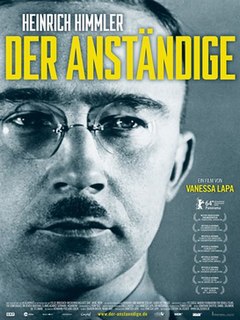 W
WThe Decent One is a 2014 German-Austrian-Israeli documentary directed by Vanessa Lapa about Heinrich Himmler. The film was based on a cache of letters and diary entries that were purchased by Lapa's parents and published in the German newspaper Die Welt. It premiered at the Berlin International Film Festival and received mixed reviews.
 W
WThe Eye of Vichy is a 1993 French documentary film directed by Claude Chabrol. It consists of a selection in chronological order of authentic footage, mostly newsreels and documentaries, shown on cinema screens in France between 1940 and 1944. Intertitles or a narrator occasionally add linking or supplementary information. The bulk of the material was produced under the Vichy régime and the aim of the film is to show the worldview which the collaborationist government of Pétain promoted to its population.
 W
WFarewell Herr Schwarz is a 2014 German–Israeli documentary film by Yael Reuveny, her first. In it she attempts to answer for herself and her family why her great-uncle, a Holocaust survivor, chose to resettle in East Germany afterwards and start a family there, a life her family in Israel only learned about after his death in the late 1980s. In the process of talking to his family, her family, and visiting the home in Vilnius where her great-uncle and grandmother lived with their family before the war, Reuveny considers issues of forgiveness, reconciliation and the effect of the Holocaust on the third generation of survivors, from her own perspective as an Israeli expatriate in Germany.
 W
WFighter is a documentary film about Arnošt Lustig (1926–2011) and Jan Wiener (1920–2010), two Jews who return to Europe to revisit the past.
 W
WA Film Unfinished is a 2010 documentary film by Yael Hersonski, which re-examines the making of an unfinished 1942 German propaganda film depicting the Warsaw Ghetto two months before the mass extermination of its inhabitants in the German operation known as the Grossaktion Warsaw. The documentary features interviews with surviving ghetto residents and a re-enactment of testimony from Willy Wist, one of the camera operators who filmed scenes for Das Ghetto. It premiered at the 2010 Sundance Film Festival, where it won the "World Cinema Documentary Editing Award". At the Hot Docs festival in Toronto, the film won the Best International Feature award. The film was released theatrically in the US on 18 August 2010.
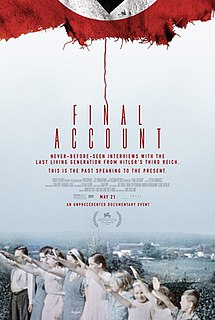 W
WFinal Account is a 2020 German-language British-American documentary film directed and produced by Luke Holland, who died shortly after post-production was completed on June 10, 2020. The film follows the last living generation of German participants in Adolf Hitler's Third Reich.
 W
WThe Final Journey is a 2010 documentary that chronicles the largest of the Nazi concentration camps that were scattered throughout Germany during the Third Reich. Created and directed by the film maker R. J. Adams and narrated by Paul Kirby, the program focuses entirely on who played key roles and howin their contribution to the tragedy of the Holocaust.
 W
WForget Us Not is a 2013 feature-length documentary film by Heather Connell, which follows the stories of some of the 5 million non-Jewish Holocaust survivors including artist Ceija Stojka and is narrated by actor Ron Perlman. The documentary was released on the festival circuit in August 2013 and has won eight awards to date including Feature Documentary and Editing Awards Of Merit from Accolade Film Competition, Helping Hand International Humanitarian Award from the Rhode Island International Film Festival, Best of Festival at Vancouver's Columbia Gorge International Film Festival, Mark Of Distinction Film at the New York Independent Film Festival and Best Narration and World Peace Impact Award from the Artisan World Peace Hamptons Film Festival and Feature Documentary Audience Award at the First Glance International Film Festival Los Angeles.
 W
WFotoamator is a 1998 Polish documentary film directed by Dariusz Jablonski, examining the life of the Jewish population and their Nazi overseers in the Łódź Ghetto.
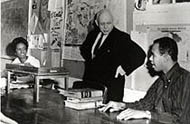 W
WFrom Swastika to Jim Crow is a 2000 documentary that explores the similarities between Nazism in Germany and racism in the American south. In 1939, the Nazi government expelled Jewish scholars from German universities. Many of them found teaching positions in Southern universities, where they sympathized with the plight of their African-American colleagues and students.
 W
WGoodbye Holland is a 2004 documentary about the extermination of Dutch Jews during World War II. The film debunks the accepted notion that the Dutch were 'good' during the war, exposing how Dutch police and civil servants helped the Nazis implement massive deportations, which resulted in the death of 78 percent of the Jews in the Netherlands.
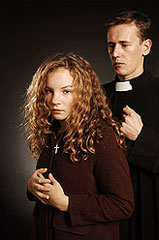 W
WHanuszka is a 2006 film by Nurit Kedar that tells the true story of a Jewish girl who survived the Holocaust in a convent, where she got to know Pope John Paul II. The film blends documentary and narrative elements to tell the atypical story of how Hanna Mandelberger escaped the Warsaw Ghetto.
 W
WIm toten Winkel - Hitlers Sekretärin is a 2002 Austrian documentary directed by André Heller and Othmar Schmiderer.
 W
WImaginary Witness: Hollywood and the Holocaust is a 2004 documentary film directed by Daniel Anker and narrated by Gene Hackman that examines the treatment of the Holocaust in Hollywood films over a period of sixty years and the impact of the films on public perception and thinking, and vice versa. The film was originally produced for the American cable network, American Movie Classics.
 W
WInheritance is a 2006 documentary film about Monika Hertwig, also known as Monika Christiane Knauss, the daughter of Ruth Irene Kalder and Amon Göth, commandant of the Płaszów concentration camp. Monika Hertwig was 10 months old when her father was hanged in 1946 for war crimes, crimes against humanity and genocide. She discovered the truth about him only as a young adult, because her own mother told her in childhood that he was a good man and a war hero. The film centers around her meeting a Holocaust survivor, Helen Jonas-Rosenzweig, who was interned at Płaszów and personally knew Göth.
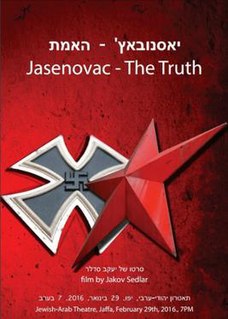 W
WJasenovac – istina is a 2016 revisionist documentary film by the Croatian filmmaker Jakov Sedlar. The film contends that the extent of the Holocaust in Croatia and the World War II-era genocide of the country's Serb population was exaggerated through post-war communist propaganda. It focuses primarily on Jasenovac, a concentration camp run by Croatia's wartime fascist Ustaše government where an estimated 100,000 are believed to have perished, and suggests that the actual death toll never exceeded 18,000. The film also argues that Jasenovac continued being used as a concentration camp by Yugoslavia's communist authorities well after World War II, and that more inmates perished when it was run by the communists than when it was run by the Ustaše.
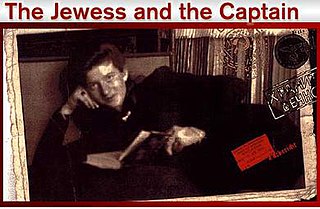 W
WThe Jewess And The Captain is a 1994 documentary, directed by Ulf von Mechow about a Holocaust love affair between Ilse Stein, an eighteen-year-old Jewish girl, and Willi Schultz, the Nazi captain in charge of the Minsk Ghetto.
 W
WKilling Kasztner: The Jew who Dealt with the Nazis is a feature-length theatrical documentary about Rudolf Kastner, and directed by Gaylen Ross.
 W
WThe Lady in Number 6: Music Saved My Life is an Academy Award-winning 2013 documentary-short film directed, written and produced by Malcolm Clarke.
 W
WThe Last Days is a documentary, directed by James Moll and produced by June Beallor and Kenneth Lipper in 1998. Steven Spielberg was one of the executive producers, in his role as founder of the Shoah Foundation. The film tells the stories of five Hungarian Jews during the Holocaust, also known as the Shoah, focusing on the last year of World War II. The film focuses on the horrors of life in the Nazi concentration camps, but also stresses the optimism and desire to survive of the survivors.
 W
WLove Inventory aka Reshimat Ahava is a 2000 Israeli documentary film, written and directed by David Fisher and produced by Yahaly Gat and David Fisher. This is the First film in the family trilogy created by director David Fisher followed by Mostar Round-Trip (2011) and Six Million and One (2011).
 W
WLuboml: My Heart Remembers is a 2003 documentary film produced by Eileen Douglas and Ron Steinman and funded by The Aaron Ziegelman Foundation. It compiles survivor interviews, archival photographs and film footage to reconstruct a sense of life in Luboml, one of the five thousand small shtetls that were destroyed by the Holocaust. The film explores the vibrant Jewish life that –once central to European Jewry – is now forever lost. Made in 2003, Luboml: My Heart Remembers was called a "must see gem" by The Forward.
 W
WMr. Death: The Rise and Fall of Fred A. Leuchter, Jr. is a 1999 American documentary film by Errol Morris about execution technician Fred A. Leuchter.
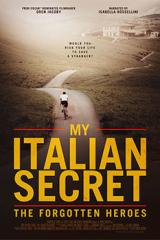 W
WMy Italian Secret: The Forgotten Heroes is a 2014 documentary film, directed and written by Oren Jacoby, that tells the story of the rescue of thousands of Italian Jews during World War II by ordinary and prominent Italians, including the champion cyclist Gino Bartali. The film had its U.S. premiere at the Hamptons International Film Festival in October 2014, and opened at theaters in Los Angeles and New York in March 2015.
 W
WMy Opposition: The Diaries of Friedrich Kellner is a 2007 documentary television film about an orphaned American who went in search of his German grandfather and discovered a secret diary written during the time of the Third Reich. The film is a production of Abella Entertainment Ltd. of Toronto, Canada, co-produced and co-directed by Arnie Zipursky and Fern Levitt, with executive co-producer Leonard Asper of CanWest Global. The film is distributed by CCI Entertainment.
 W
WNicky's Family is a 2011 Czech docudrama directed by Matej Mináč. It is based on the work of Nicholas Winton prior to the outbreak of World War II.
 W
WNight and Fog is a 1956 French documentary short film. Directed by Alain Resnais, it was made ten years after the liberation of Nazi concentration camps. The title is taken from the Nacht und Nebel program of abductions and disappearances decreed by Nazi Germany. The documentary features the abandoned grounds of Auschwitz and Majdanek established in occupied Poland while describing the lives of prisoners in the camps. Night and Fog was made in collaboration with scriptwriter Jean Cayrol, a survivor of the Mauthausen-Gusen concentration camp. The music of the soundtrack was composed by Hanns Eisler.
 W
WNight Will Fall is a 2014 documentary film directed by Andre Singer that chronicles the making of the 1945 British government documentary German Concentration Camps Factual Survey. The 1945 documentary, which showed gruesome scenes from newly liberated Nazi concentration camps, languished in British archives for nearly seven decades and was only recently completed.
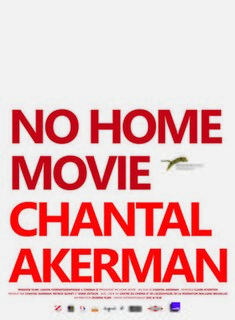 W
WNo Home Movie is a French-Belgian 2015 documentary film directed by Chantal Akerman, focusing on conversations between the filmmaker and her mother just months before her mother's death. The film premiered at the Locarno Film Festival on 10 August 2015. It is Akerman's last film.
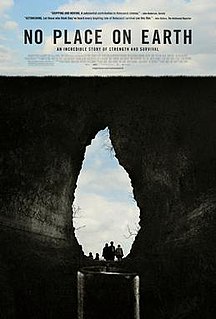 W
WNo Place on Earth is a 2012 documentary film produced, written and directed by Janet Tobias, based on Esther Stermer's memoir We Fight to Survive. It was released theatrically in the United States on April 5, 2013.
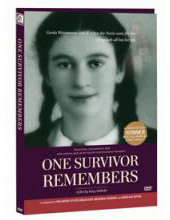 W
WOne Survivor Remembers is a 1995 documentary short film by Kary Antholis.
 W
WPaper Clips is a 2004 American documentary film written and produced by Joe Fab, and directed by Fab and Elliot Berlin, about the Paper Clips Project, in which a middle school class tries to collect 6 million paper clips to represent the 6 million Jews killed by the Nazis during World War II.
 W
WParadise Camp is a 1986 documentary film about Theresienstadt concentration camp in Czechoslovakia, written and directed by Australians Paul Rea and Frank Heimans, respectively. Czechoslovakian Jews were first told that Theresienstadt was a community established for their safety. They quickly recognized it as a ghetto and concentration camp.
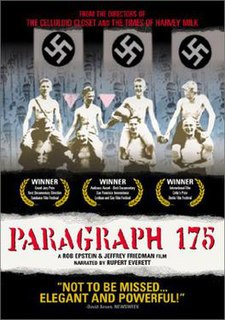 W
WParagraph 175 is a documentary film released in 2000, directed by Rob Epstein and Jeffrey Friedman, and narrated by Rupert Everett. The film was produced by Rob Epstein, Jeffrey Friedman, Janet Cole, Michael Ehrenzweig, Sheila Nevins and Howard Rosenman. The film chronicles the lives of several gay men and one lesbian who were persecuted by the Nazis. The gay men were arrested by the Nazis for the crime of homosexuality under Paragraph 175, the sodomy provision of the German penal code, dating back to 1871. Between 1933 and 1945, 100,000 men were arrested under Paragraph 175. Some were imprisoned, others were sent to concentration camps. Only about 4,000 survived.
 W
WA People Uncounted is a 2011 Canadian documentary film directed by Aaron Yeger. It tells the story about the culture and history of the Romani people in Europe, with special emphasis on their plight during The Holocaust. The film also warns of the similarities in intolerance between the time of the Porajmos and the increasing intolerance and abuse of Roma rights in Europe today. It was nominated for a Producers Guild of America award in 2012. The film was featured in the New York Gipsy Festival and is part of Vanderbilt University's Holocaust Lecture Series.
 W
WPola's March is a 2001 documentary made by Jonathan Gruber about a Holocaust survivor, Pola Susswein's emotional trip back to her childhood home in Poland after fifty years spent in Israel, trying to forget her painful past.
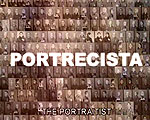 W
WThe Portraitist is a 2005 Polish television documentary film about the life and work of Wilhelm Brasse, the famous "photographer of Auschwitz", made for TVP1, Poland, which first aired in its "Proud to Present" series on January 1, 2006. It also premiered at the Polish Film Festival, at the West London Synagogue, in London, on March 19, 2007.
 W
WPrisoner of Her Past is a 2010 documentary film, produced by Kartemquin Films, that follows the journey of Chicago Tribune music critic Howard Reich as he travels to Europe to discover why his elderly mother, Sonia Reich, believes people are trying to kill her.
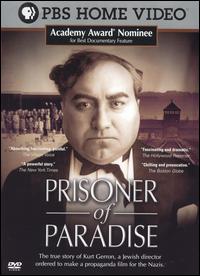 W
WPrisoner of Paradise is a 2002 documentary film directed by Malcolm Clarke and Stuart Sender. The film is an international co-production of Canada, the United States, and the United Kingdom, and tells the true story of Kurt Gerron, a German-Jewish cabaret and film actor in the 1920s and 1930s who was deported to the Theresienstadt concentration camp in Czechoslovakia during World War II. There, Gerron was ordered to write and direct a Nazi propaganda film.
 W
WRed Shirley is a short documentary film directed by Lou Reed. It tells the story of his cousin, Shirley Novick, living through World War I, fleeing Poland before World War II, and taking part in the March on Washington for Jobs and Freedom. The film was shot by photographer Ralph Gibson, and the soundtrack was recorded by Metal Machine Trio.
 W
WShadows of Memory is a 2000 documentary by Claudia von Alemann that describes the rise and fall of Hitler from the perspective of a Nazi supporter—Alemann's 84-year-old mother.
 W
WShoah is a 1985 French documentary film about the Holocaust, directed by Claude Lanzmann. Over nine hours long and 11 years in the making, the film presents Lanzmann's interviews with survivors, witnesses and perpetrators during visits to German Holocaust sites across Poland, including extermination camps.
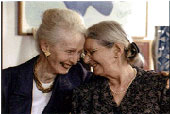 W
WSisters in Resistance is a 2000 documentary by Maia Wechsler that tells the story of four young Frenchwomen who fought against the German occupation of France during World War II. The film won Outstanding Documentary by the Academy Award Screening Committee and won Best Documentary in the Woman in Cinema Film Festival.
 W
WSix Million and One is a 2011 Israeli documentary film, a Fisher Features Ltd. release, written directed and produced by David Fisher. This is the third and final film in the family trilogy created by Fisher after Love Inventory (2000) and Mostar Round-Trip (2011).
 W
WThe Sixth Battalion is a 1998 documentary film that examines the history of Jewish soldiers who fought for the Slovak Republic, a puppet state created by Nazi Germany, during World War II. The documentary combines interviews with archival footage and photographs of the Slovak Republic in order to provide a brief history of the state, exploring the rise of antisemitism and how it affected these Jewish soldiers.
 W
WThe Sorrow and the Pity is a two-part 1969 documentary film by Marcel Ophuls about the collaboration between the Vichy government and Nazi Germany during World War II. The film uses interviews with a German officer, collaborators, and resistance fighters from Clermont-Ferrand. They comment on the nature of and reasons for collaboration, including antisemitism, Anglophobia, fear of Bolsheviks and Soviet invasion, and the desire for power.
 W
WStalags is a 2008 Israeli documentary film produced by Barak Heymann and directed by Ari Libsker. The film examines the history of Stalags, pornography books that featured sexy female Nazi officers sexually abusing male camp prisoners. The pocket books broke sales records and sold hundreds of thousands of copies in Israel in the 1960s during the trial of Adolf Eichmann. After the authors of the books were accused of distributing anti-Semitic pornography, the popularity of the books declined. The documentary opened in limited release on April 9, 2008.
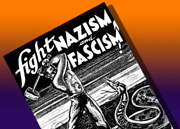 W
WThey Were Not Silent is a documentary about the Jewish Labor Committee's anti-Nazi movement in the United States before, during and after World War II. The film features rare archival footage and photographs along with interviews with labor veterans, Holocaust survivors and scholars. It explores how international Jewry worked to help Jews and non-Jews in Germany, Poland, and elsewhere in Europe. The JLC's role has changed over the years. A trade unionist who has focused on JLC history, Kenneth Burt, says he hopes that the documentary will encourage new interest in the organization.
 W
WWe Were So Beloved is a 1985 documentary film by Manfred Kirchheimer about Jewish survivors of the Holocaust living in Washington Heights, Manhattan in New York City. It consists of interviews with family and friends interspersed with written and spoken quotes from Mein Kampf to remind the viewer of the evil that had preceded. The film received mixed reviews.